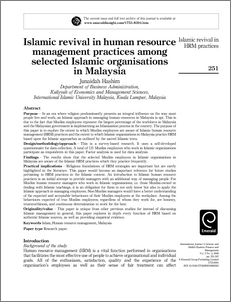Hashim, Junaidah
(2009)
Islamic revival in human resource management practices among selected Islamic organisations in Malaysia.
International Journal of Islamic and Middle Eastern Finance and Management, 2 (3).
pp. 251-267.
ISSN 1753-8394
![[img]](http://irep.iium.edu.my/style/images/fileicons/application_pdf.png)  Preview |
|
PDF (Islamic revival in human resource management practices among selected Islamic organisations in Malaysia)
- Published Version
Download (102kB)
| Preview
|
Abstract
Purpose – In an era where religion predominantly presents an integral influence on the way most people live and work, an Islamic approach in managing human resources in Malaysia is apt. This is due to the fact that Muslim employees represent the largest percentage of the workforce in Malaysia and the Malaysian government is implementing an Islamization process in the country. The purpose of this paper is to explore the extent to which Muslim employees are aware of Islamic human resource management (HRM) practices and the extent to which Islamic organisations in Malaysia practice HRM based upon the Islamic approaches as outlined by the sacred Islamic texts.
Design/methodology/approach – This is a survey-based research. It uses a self-developed questionnaire for data collection. A total of 121 Muslim employees who work in Islamic organisations participate as respondents in this paper. Factor analysis is used for data analysis.
Findings – The results show that the selected Muslim employees in Islamic organisations in Malaysia are aware of the Islamic HRM practices which they practice frequently.
Practical implications – Religious foundations of HRM strategies are important but are rarely highlighted in the literature. This paper would become an important reference for future studies pertaining to HRM practices in the Islamic context. An introduction to Islamic human resource
practices is an initial attempt to provide managers with an additional way of managing people. For Muslim human resource managers who work in Islamic organisations, i.e. those Muslim-owned or dealing with Islamic teachings, it is an obligation for them to not only know but also to apply the Islamic approach in managing employees. Non-Muslim managers would have a better understanding of the expected and acceptable behaviours of their Muslim employees at the workplace. Among the behaviours expected of true Muslim employees; regardless of whom they work for, are honesty,
trustworthiness, and continuous determination to work for the best.
Originality/value – This paper is unique from other previous studies for instead of discussing Islamic management in general, this paper explores in depth every function of HRM based on authentic Islamic sources, as well as providing empirical evidence.
Actions (login required)
 |
View Item |


 Download Statistics
Download Statistics Download Statistics
Download Statistics